Updated Wednesday, May 4, Beirut, 19h
TAKEAWAY: We have seen the photos, and we know that Bin Laden compound as if we had vacationed there a month. But it is those informational graphics that show us how the military action by the US Navy Seals took place. Our guest artist today is Jeff Goertzen, of The Denver Post, and he details the process of getting his big graphic ready for publication. ALSO: How Dubai’s Gulf News approached the story with informational graphics AND: Bild’s pop up moments show us how and where Bin Laden was captured
Of special related interest today:
– USA: The death of Osama bin Laden: New York Times interactive gauges public opinion
http://blogs.journalism.co.uk/editors/2011/05/03/the-death-of-osama-bin-laden-new-york-times-interactive-gauges-public-opinion/
Photos offer the initial shock, info graphics help to explain story
The photos are all in, including the now famous fake one showing a Bin Laden burned to a crisp (ouch!). As the story reaches its second and third day, it is informational graphics that begin to answer many of the questions we all have about how this military action took place.
I asked Jeff Goertzen, of the Denver Post, to share with us the meticulous (and perhaps painful) process he followed as he prepared this infographic on deadline:
Sketch in the makings
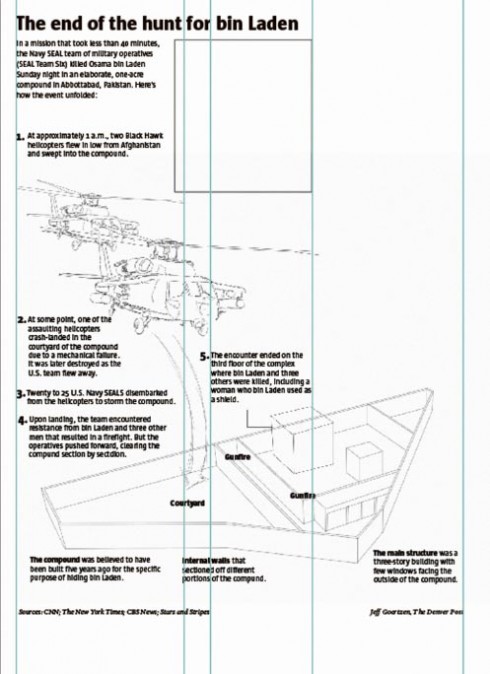
Before corrections
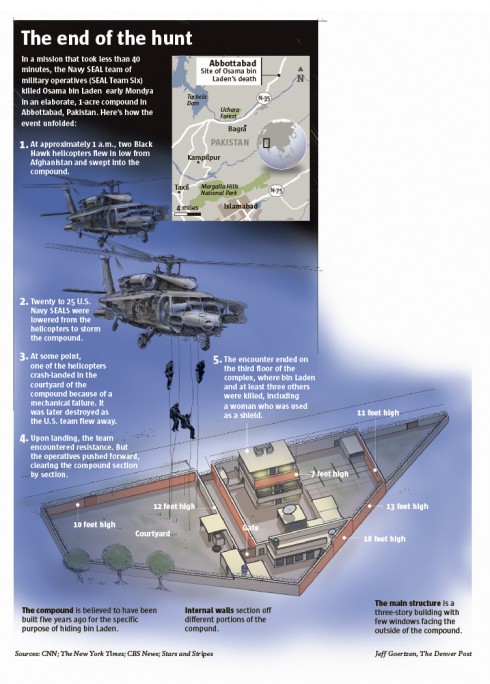
Final version
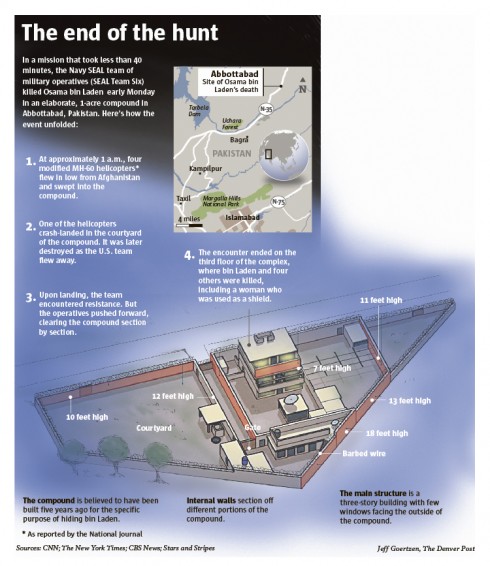
Here are the two versions of the assault on the compound that I worked on Tuesday. The first graphic illustrates Two Black Hawk helicopters descending on the compound with Navy SEALS repelling. Early reports from virtually every news source indicated that the U.S. sent in two Black Hawk helicopters. As for how the Navy SEALS exited the aircraft was uncertain. Some sources said they repelled, others were more vague and just said they exited. Toward the end of the evening, because we were unable to confirm the correct helicopters used in the assault, the helicopters were also removed from the graphic. In the end, they were modified MH-60 Black Hawk helicopters. So the original version was correct.
Speaking as an editor, decisions like this are sometimes no brainers. We don’t take chances with the visual representation of our graphics if we are not absolutely sure about the facts. If we illustrate the wrong aircraft, we look foolish the next day. Speaking as a graphics artist, eliminating visual details, such as the helicopters, is extremely difficult, because it takes away from the visual impact of the graphic. Lesson learned? …. Better safe than sorry.
Update from Jeff Goertzen on his graphics here
One of the greatest frustrations about creating breaking news graphics is the challenge of getting accurate information on deadline. The graphic I illustrated of the raid on Osama bin Laden’s compound was a classic example of how information and facts change during the day, making it difficult decide what you should and shouldn’t illustrate.
By noon, I made this rough layout of the graphic and wrote the text with the information I had at the time. It shows two Black Hawk helicopters with an arrow indicating where they landed in the courtyard. The text says there were 20-25 Navy SEALS involved in the operation.
(Image 1)By 3 p.m. I had the first version of the finished graphic illustrating the two helicopters with Navy SEALS repelling towards the courtyard of the compound. This was visual information I had seen on one of the networks. At this point, reports from virtually every news source indicated that the U.S. sent in two Black Hawk helicopters. As for how the Navy SEALS exited the aircraft now was uncertain. Some sources said they repelled, others were more vague and just said they disembarked. So this part of the illustration would have to be eliminated.
(Image2)By 7 p.m. some reports were indicating that there were four modified M60 Black Hawk helicopters and other sources were mentioning the presence of a Chinook. And the actual number of operatives that stormed the compound were uncertain as well.
By 9:30 p.m. the editors decided to eliminate the helicopters and images of the Navy SEALS altogether. We also made no reference to the number of operatives.
(Image 3)
How others covered the same event
Jeff Goertzen sends us how other newspapers covered the very same incident here:
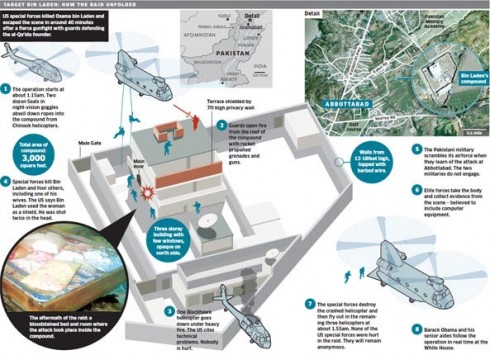
The Independent, London
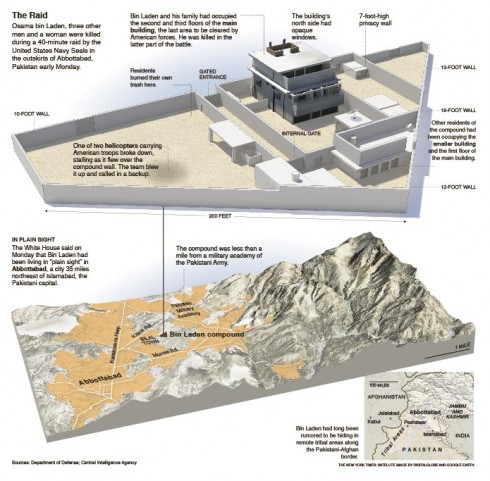
The New York Times
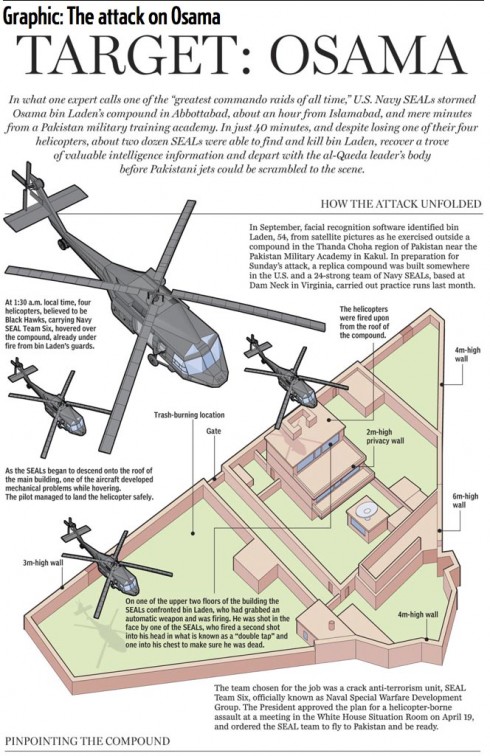
National Post, Canada
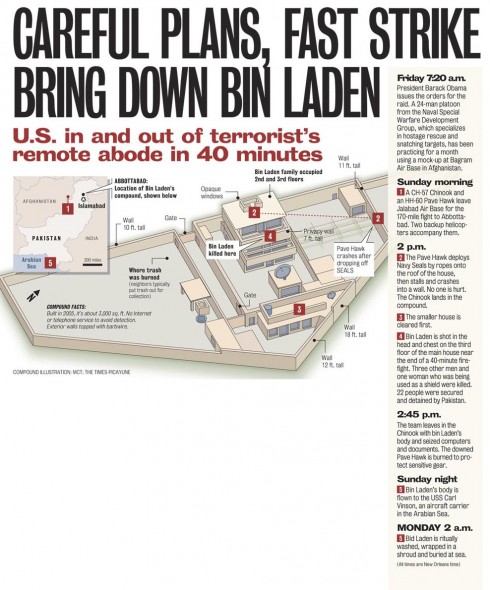
The Times Picayune, New Orleans, USA
In Dubai: The Gulf News and explanatory graphics
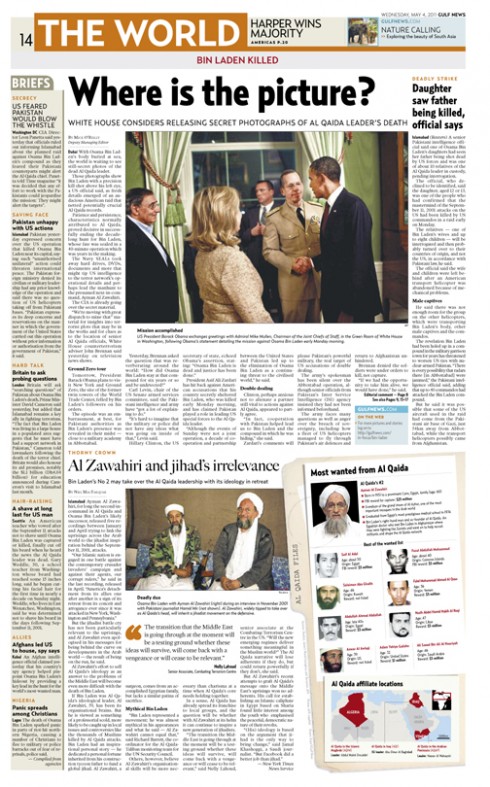
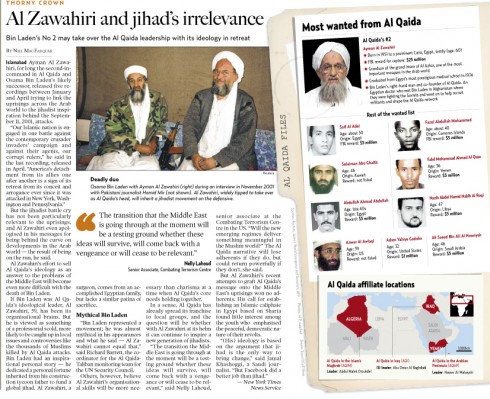
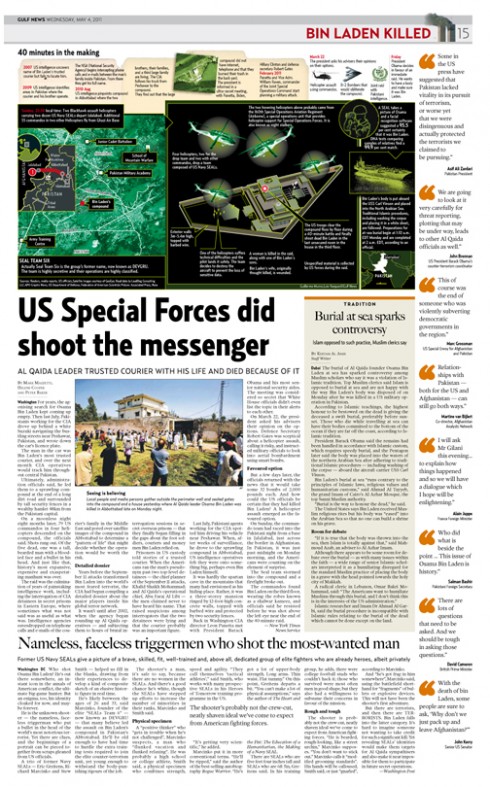
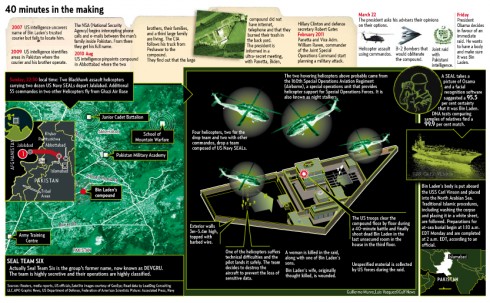
Miguel Gomez, design director of Dubai’s Gulf News, shares these graphics with us and offers this commentary to help us appreciate them:
For these graphics we used the concept of the “file”, to give the impression that this was an action planned for a long time; in addition, for the second graphic we decided to go with a “night vision” concept, to give readers an idea of the conditions the US Navy Seals operated in during the raid of the Bin Laden compound and the firefight that followed leading to his capture and killing
Note: The Gulf News graphics were executed by Guillermo Munro, Dwynn Trazzo and Luis Vazquez .
The Bild app’s pop up moments and the Bin Laden story

And here are two videos from Germany’s Bild and how they pointed users to the location of Bin Laden’s capture, emphasizing the how and where:
On this pop up moment, Bild offers us an inventory of terrorists: who is still wanted? Who is next? Who is dead? Who is in prison?
…..and finally, sand art telling the story in India
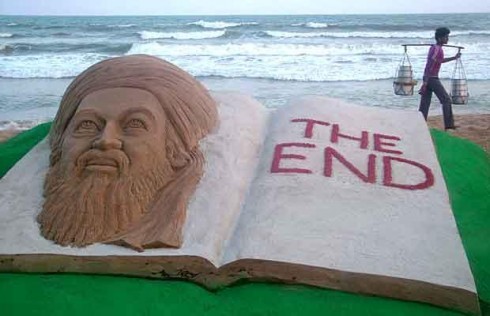
Indian sand artist Sudarshan Patnaik creates a sand sculpture to give the story its proper closure!
The sand sculpture of Al Qaeda leader Osama bin Laden is on a beach in Puri in the eastern Indian state of Orissa.
Bin Laden death: some pages that caught our eye
TAKEAWAY: It’s all one hear on TV news channels these days: the post mortem of the Osama Bin Laden killing by a brave elite team of US Navy Seals. Reviewing the front pages of US newspapers yields some interesting poster-like approaches to the story of the decade. We also show you other interesting front pages we are receiving from around the world. To be updated throughout the day.
Gulf News, Dubai, UAE
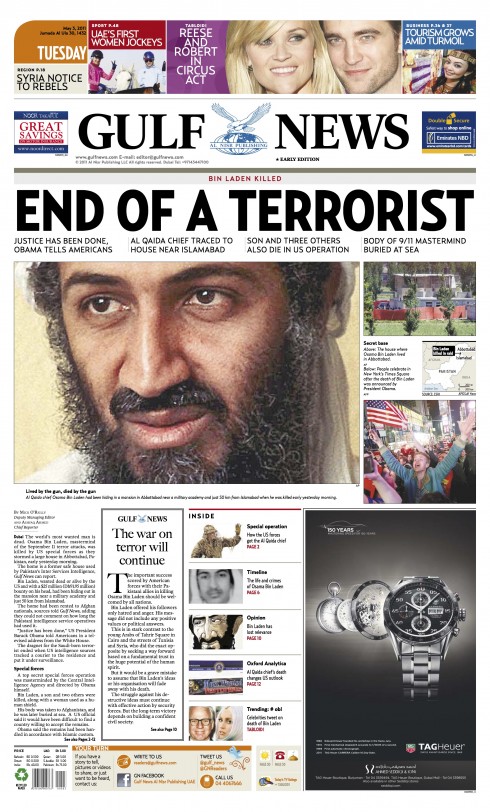
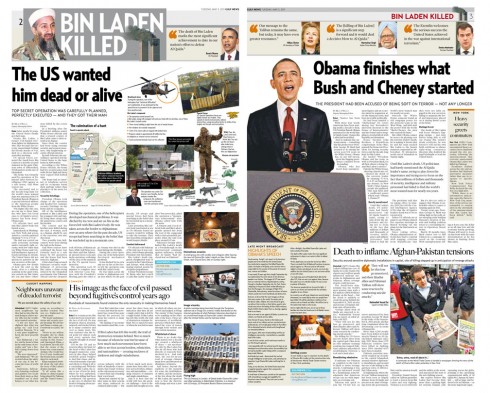
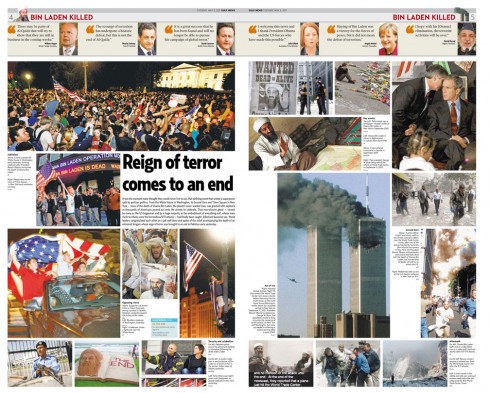
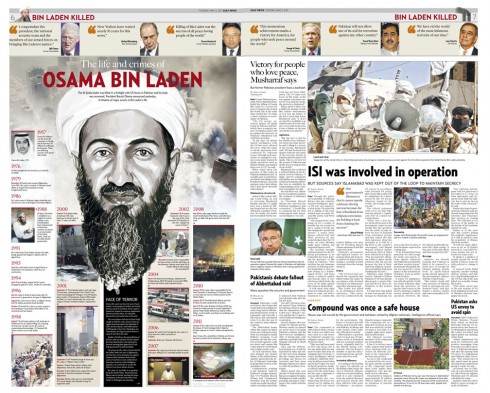
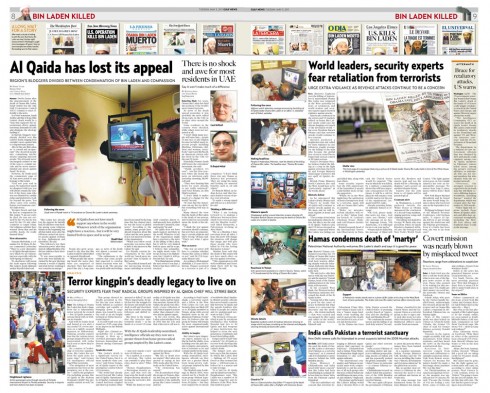
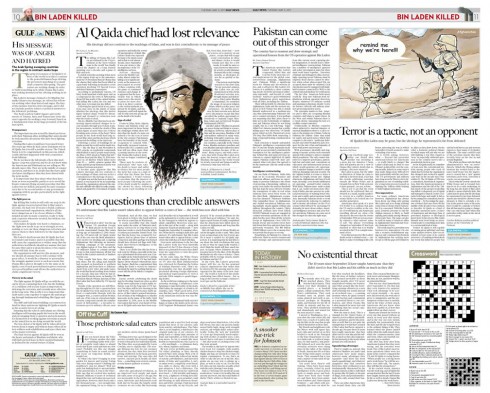

We receive a set of pages from Miguel Gomez, design director, Gulf News of Dubai. His team has done a remarkable job preparing a 12-page package, including a retrospective of Bin Laden’s “life and crimes”, analysis of the news and what it means for the US and the world, reactions from around the world, and an interesting balcony treatment of how front pages from around the world reported the news. Some well detailed, informative graphics also appeared, depicting the military action that led to Bin Laden’s killing.
Il Secolo XIX (Genoa, Italy)
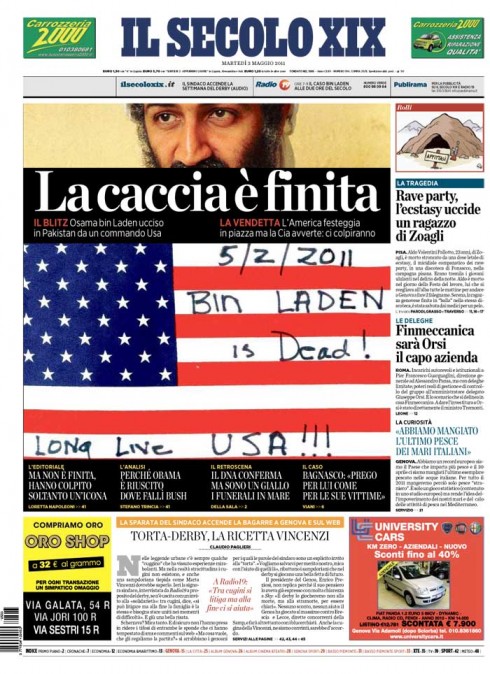
Massimo Gentile, design director of Il Secolo XIX, sends us his front page of today, again, using the now well known mini poster concept, with this explanation:
“It was difficult for us to do this one, since this happened many hours before our paper would come out. The headline says: The Hunt is Over. We decided to go with close up of Bin Laden’s eyes, and the American flag with the lettering on it. So we did the best we could for this front page.”
Hail those poster-styled front pages
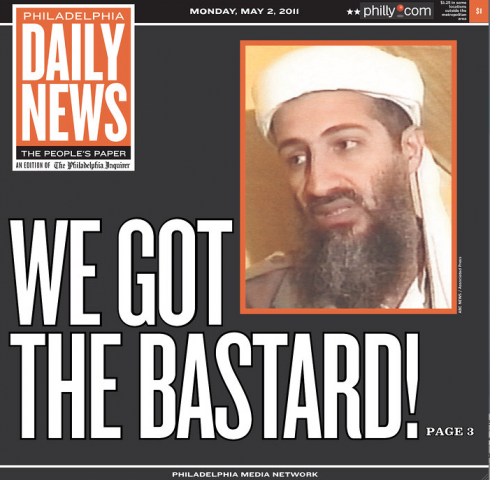
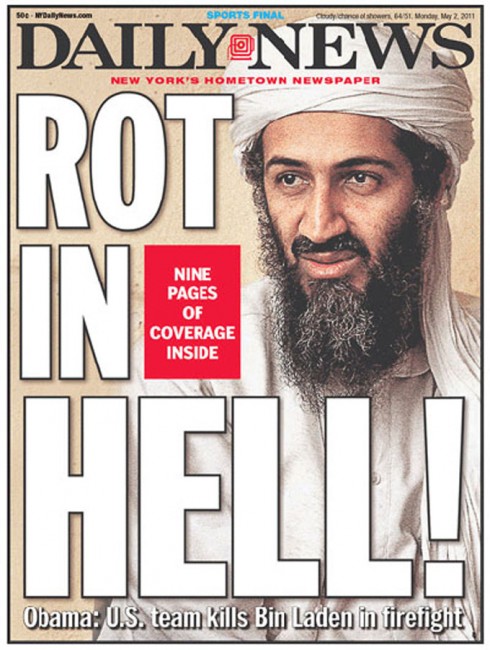
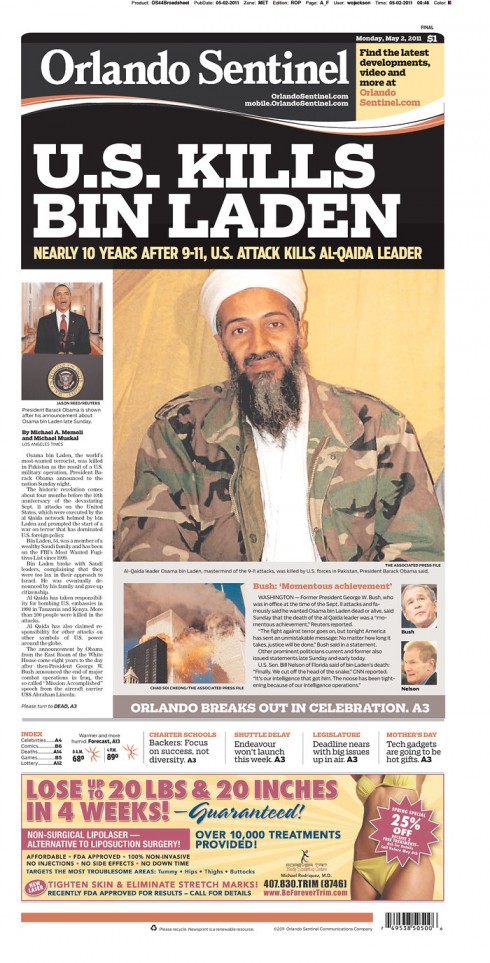
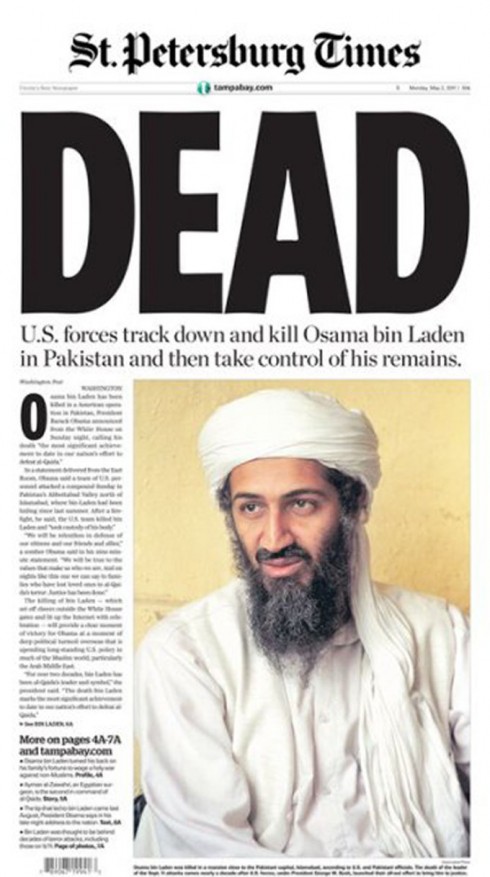
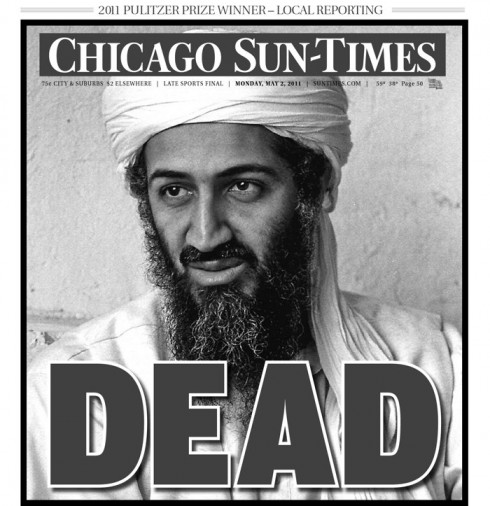
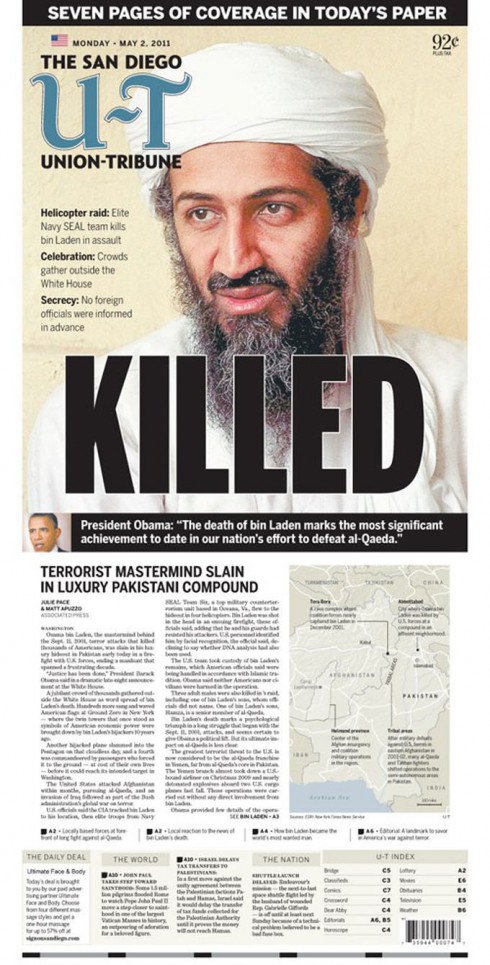

The poster look for Page One is very much alive. Some of the best treatments of the Bin Laden story show the big headline, the large photo and the impact of the poster. Indeed, I am surprised that the headlines are short, to the point, and, in most cases, telling the obvious. But during times like these, newspaper editors prefer to go back to the iconic look of newspapers of another era, when the big headlines REALLY revealed exclusives and surprised the readers. In a sense, I like the retro approach many of these samples provide.
Will be updating the blog during the day to show other examples, including info graphics of how the attack took place.
Stay tuned and come back for more.
As seen on CNN….
Television commentators, too, seem to have a fascination with how newspapers cover the Bin Laden story. This morning a CNN reporter held up a copy of the Gulf News, of the UAE, as seen here.
Of special interest today
– USA: Coming soon to a theater near you: The New York Times
http://www.niemanlab.org/2011/05/coming-soon-to-a-theater-near-you-the-new-york-times/
– USA: At the NYT, no paywall exemption for Bin Laden
http://www.niemanlab.org/2011/05/at-the-nyt-no-paywall-exemption-for-bin-laden/?utm_source=feedburner&utm_medium=feed&utm_campaign=Feed%3A+NiemanJournalismLab+%28Nieman+Journalism+Lab%29
– USA: Bin Laden death spurs sales of papers
http://www.newsandtech.com/whats_new/article_de2e86ba-74ec-11e0-ba23-001cc4c002e0.html
TheMarioBlog post #765
WoodWing Xperience seminar May 24-25 in Amsterdam

I am honored to be one of three keynote speakers at the upcoming WoodWing Xperience seminar in Amsterdam May 24-25
I did a previous keynote for a WoodWing Tour function in London in 2010.
For those interested in attending, here is more information:
May 24-25, 2011, Amsterdam, Netherlands
http://xperience.woodwing.com
Death of Bin Laden: a perspective from Lebanon (follow frequent live coverage today)
TAKEAWAY: Waking up in Beirut to the news of Osama Bin Laden’s death. Already discussing it with art director at An Nahar, the Arabic language daily, and it will be interesting to follow up the rest of the day with the Lebanese perspective of this monumentally important development in the fight against terrorism. Stay tuned. ALSO: The Royal Wedding, part 2: a kiss pop up moment and a textbook case of good packaging for coverage of the event
Final page one for Tuesday
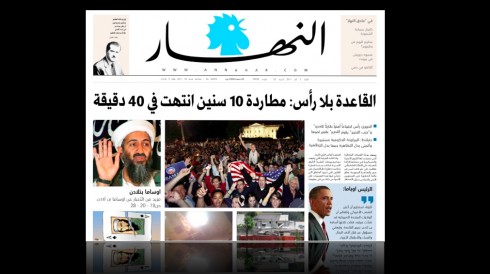
Top portion of An Nahar front page for Tuesday, May 3
It was a long and busy day, but the top of Page One is now done with the Bin Laden package.
The Mondrian managed to package enough images to tell the story at a glance, and the headline over the package reads: Al Qaeda is headless: Ten year chase ends in 40 minutes
The story thru an illustration
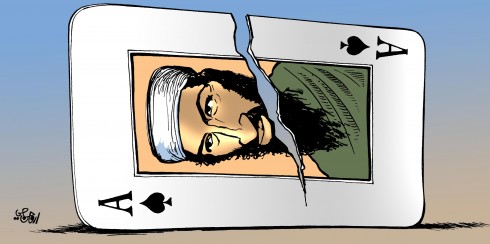
The Bin Laden story as seen by An Nahar illustrator Armand Homsi
First thing art director Ziad Kassis and I discussed over morning coffee today was to consider an illustration for Page One of An Nahar.
Remember, it is 24 hours between the time the news broke about the killing of Bin Laden, and when the printed edition of An Nahar will reach readers. We are already saturated with so many images of the event that we had a briefing with that talented illustrator, Armand Homsi, and told him that his illustration could go on Page One——maybe. Armand does illustrations for the supplements, and they are all top of the line quality.
Here is what he has produced, absolutely direct, elegant and worthy of Page One. But the editors have decided that the illustration would soften the impact of the news and to go with the Mondrian photo approach (see below).
However, Ziad and I have just decided to use the illustration, smaller, as part of the Mondrian grouping, then display it big inside, to do it justice.
The Mondrian-style front page takes shape
First sketch of the front page on the screen as we discuss the content/design with the editors
Good page one meeting and our idea of a Mondrian concept—-creating a collage of images on Page One to tell the Bin Laden story shapes up.
And, alas, the talented An Nahar illustrator, Armand Homsi, produces an illustration that will be played big inside, but we must incorporate it into the Mondrian.
The editor in chief of An Nahar, Mr. Francois Akl, offers me a fascinating perspective when I ask him what the Osama Bin Laden death means to the average Lebanese:
“For us this is a purely American story, in a sense. Of course, we are interested in this, but we have too many problems in this country, so this is NOT for us the same it is for American readers. The average Lebanese person feels indifferent about this. They did not like Bin Laden, and, depending on where in the country you may be, some like Bin Laden, so you see, the story for us is quite different for what it is for you Americans.”
And Editor Akl agreed that one of the photos in the Mondrian must be Americans celebrating outside the White House, a place where there has been little celebrations lately.
Discussions of our An Nahar front page for tomorrow
Right now, in mid afternoon here in Beirut, the art director, Ziad Kassis, and I, play with a variety of options before the 6 pm meeting in about two and a half hours, which is a more decisive step towards the planning of tomorrow’s front page.
Remember, we launched a new design of this Lebanese newspaper only three weeks ago, and the front page has followed a consistent style for the obvious reasons.
Tomorrow, however, we may drop the promos that appeared top left altogether, or we may make the promos part of the fabric of the page one illustration, since they may be part of the Bin Laden coverage.
Meanwhile, we have the talented illustrator from An Nahar working on an illustration collage, but we know that the still conservative editors here may feel that an illustration is too soft a treatment for such an important newsy story.
At almost 5 pm, this is where we are with the design of Page One. I am suggesting that we create a Mondrian effect to incorporate various images of the Bin Laden story into one large block, which will probably be six columns, in case the illustration does not fly.
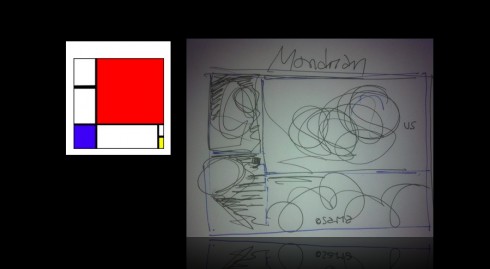
Here is my sketch, inspired by Mondrian structure, for a group of images in tomorrow’s front page.
Stay tuned.
Citizen journalists to the rescue
It has happened again, this An IT consultant, living in Abbottabad, who unknowingly tweeted details of the US-led operation as it happened. Sohaib Athar wrote that a helicopter was hovering overhead shortly before the assault began and said that it might not be a Pakistani aircraft. His first posting was at around 1am local time.
He wrote: “Helicopter hovering above Abbottabad at 1AM (is a rare event).”
Soon after, he reported the sound of an explosion, now known to have been US forces blowing-up their damaged helicopter.
“A huge window shaking bang here in Abbottabad Cantt. I hope its not the start of something nasty :-S”
Remember in 2009, when the event that came to be known Miracle on the Hudson occurred: the landing of US Airways flight 1149 jet into the Hudson River? The first reports of that incident came from citizens who were watching it happen from the windows of their offices in New York City.
It reminds us how difficult it is becoming for the official media to get there first.
And the crowds chanted….
Woke up at 7 am, turned on CNN and could not believe my eyes and ears: Osama Bin Laden dead announced the network’s Wolf Spitzer as a crowd gathered outside the White House around 1 in the morning, US flags everywhere, same thing in the reports from New York City’s Ground Zero, a symbolic gathering for those who came, as one firefighter put it “to honor my fellow firefighters who died here, now they know justice has been done.”
Outside my balcony in Beirut, total silence, a day off for workers who celebrate the May 1 International Workers Day festivity.
Then a meeting now with Ziad Kassis, the art director of An Nahar, to plan the front page of the newspaper. “Big news, indeed, ” he tells me, “and we will go 8 columns across with it tomorrow.”
The iPad already played a role here, as one of the guys celebrating outside the White House raised his iPad to show a screen that read: Obama1, Osama 0.
It should be interesting to contemplate this development from the Middle East. I promise more reports as the day progresses. Come back and check with me from time to time.
The making of page one: An Nahar
Like editors and designers worldwide, we are now working on the possible visual scenarios for Page One of An Nahar tomorrow.
Twenty four hours will have passed from the time the world found out Osama Bin Laden is dead. In one of our discussions, we are leaning towards a good illustration capturing the highlights of the man’s life and death, but the editor is not sure a soft illustration will do justice to the newsy event; we are also planning a photo collage of the most momentous events in Bin Laden’s life. All options are on the table.
As this is an Arabic language daily, I wanted to step gingerly into the discussion, but was reassured by two editors that the people of Lebanon are as happy to see “this man we hated” no longer with us.
Will continue to report on our front page concept as the day advances.
TheMarioBlog post #764